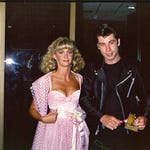Broadway-bound songsmith Frank Loesser wrote “Baby It’s Cold Outside” as a call-and-response duet for he and his wife to perform at parties. Several years later, the tune made its way into a movie and soon took the Christmas canon by storm. But is it a “rapey” relic of a bygone era that should be buried permanently in the winter snow? Amna Khalid investigates.
Happy New Year! In the warm and generous spirit of the holidays, we’re offering 30% off a subscription to Booksmart Studios until the end of the year. You’ll get extra written content and access to bonus segments and written transcripts like this one. More importantly, you’ll be championing all the work we do here. Become a member of Booksmart Studios today. Thank you for your support.
* TRANSCRIPT *
MAN: Thank you, thank you, thank you. Do we have any more requests?
WOMAN: Baby, It's Cold Outside!
MAN: I think we can make that happen. Who wants to take the duet?
AMNA KHALID: In the new Netflix rom-com Love Hard, Josh volunteers to sing a duet with his girlfriend — his pretend girlfriend, actually — Natalie:
JOSH: Natalie and I got this one, Dad.
KHALID: The two are out caroling with his family in snowy Lake Placid.
NATALIE: Over my cold, dead, lifeless body. I am not singing that — that is like the sexual assault theme song.
KHALID: Natalie refuses at first to sing that Christmas song, because, you know, it's that song — the one in which a man is possibly pressuring a woman into spending the night. But Josh has an idea.
JOSH: Look, this is what we’re gonna do, okay? You just do your part. I will change my lyrics so the song doesn't sound so, uh, rapey.
NATALIE: Fine, let's just get this over with.
JOSH: Dad, hit it.🎶
NATALIE: I really can’t stay
JOSH: No problem, there’s the door
NATALIE: I’ve got to go away
JOSH: I hear you, say no more
NATALIE: This evening has been
JOSH: Totally consensual
NATALIE: So very nice
JOSH: I hope you get home safe tonight
KHALID: It's become fashionable in recent years to alter the lyrics of Baby, It's Cold Outside to make them less “rapey,” as the character Josh put it. Others have pushed back, however. The song, they claim, is about a desirous woman battling not the unwanted advances of her date but the unsolicited judgment of society.
🎶
LYNN GARLAND: I really can't stay
FRANK LOESSER: But Baby, it's cold outside
GARLAND: I've got to go away
LOESSER: But Baby, it's cold outside
GARLAND: This evening has been —
LOESSER: Been hoping that you'd drop in
GARLAND: So very nice
LOESSER: I'll hold your hands, they're just like ice
KHALID: I'm Amna Khalid. On this episode of Banished, The Bother with Baby.
CHRIS WILLMAN: The song was written in 1944 as a song that Frank Loesser and his wife originally sang at a housewarming party.
KHALID: Chris Willman is a longtime music journalist, currently at Variety.
WILLMAN: Kind of like, the night’s about to end, we’re about to kick you out, and here’s a song about whether to stay or whether to go.
KHALID: Wow, I would have loved to be at that party.
WILLMAN: Oh, yeah. And apparently they performed it over a period of years to the point that, when it was licensed for a film in 1949, Frank Loesser’s wife resented it. She may have been joking, but she was resentful that it was no longer their private thing because they were such a hit on the party circuit with it.
KHALID: The song existed in private for five years, sung only by Loesser and his wife Lynn Garland. The two made one of the very first recordings of the song, which we’re listening to now.
🎶
LOESSER: Baby, make my conscious your guide
GARLAND: I really can't stay
LOESSER: Oh, Baby, don't hold out
GARLAND AND LOESSER: Ah but it's cold outside
LOESSER/GARLAND in the clear
KHALID: Baby was evocative of the holidays, it was redolent of cigarettes and booze and, yes, it was sexually suggestive.
GARLAND: And it was our song.
KHALID: That’s Lynn Garland from the documentary Heart and Soul: The Life and Music of Frank Loesser:
GARLAND: And we became the most desired guests at parties from coast to coast. And we never failed to slam.
KHALID: Garland recalled once that, "Parties were built around our being the closing act.”
🎶
LOESSER: I thrill when you touch my hand
GARLAND: But don't you see?
LOESSER: How can you do this thing to me?
KHALID: It was merely the opening act, however, for the song itself. Baby was such a sensation at private gatherings that Loesser worked it into his score for the 1949 movie Neptune's Daughter. This would be the first time anyone heard the song outside of someone’s living room.
WILLMAN: And when it went public in 1949 it kind of exploded. Immediately, people started covering it. My favorite version of the song, by Johnny Mercer and Margaret Whiting. I think that was the biggest hit anyone had with it that year.
🎶
WHITING: I really can't stay
MERCER: But Baby, it's cold outside
WHITING: I've got to go away
MERCER: But Baby, it's cold outside
WHITING: This evening has been
MERCER: Been hoping that you'd drop in
WHITING: So very nice
MERCER: I'll hold your hands, they're just like ice
KHALID: No fewer than 10 separate recordings were made in 1949 alone. Bing Crosby, Bob Hope, Doris Day, Dinah Shore. They all put their stamp on the song, but the version you’re probably most familiar with is the one that Chris Willman prefers. The one you hear on adult contemporary radio stations every December, when they switch over to an all holiday format. The classic recording by Johnny Mercer and Margaret Whiting.
🎶
WHITING: To break the spell
MERCER: I'll take your hat, your hairs looks swell
WHITING: I ought to say no, no, no sir
MERCER: Mind if I move in closer?
WILLMAN: I like it partly because it sounds like 1949. It really puts you in that era where these people are really playing out these roles. I think when people do modern versions it sounds kind of ridiculous because you don’t really buy it, that they have to go through this dance. It’s coming through the same radio where we hear all these incredibly sexually — not just suggestive but explicit songs — and so it’s hard to hear modern singers and still have that sense of reserve and that there are these restrictions on what they have to go through. And for some reason the sexual heat seems more intensified to me when it sounds like it’s happening in that era. Johnny Mercer sounds horny when he’s doing it.
KHALID: Yeah!
WILLMAN: And Margaret Whiting too. And then, you know, when you hear Willie Nelson and Norah Jones doing it, it’s just not the same.
KHALID: And that’s precisely the question for many modern listeners of the song. It may be apparent that Mercer feels the “sexual heat” — but what about Margaret Whiting? Is she feeling it too? That all depends on how you choose to interpret the lyrics, or, in the case of Neptune’s Daughter, what you choose to see on the screen.
🎶
ESTHER WILLIAMS: I really can't stay
RICARDO MONTALBAN: Baby, it's cold outside
WILLIAMS: I've got to go away
MONTALBAN: But Baby, it's cold outside
KHALID: In the 1949 movie, Ricardo Montalban repeatedly tugs at the arm of Esther Williams. He pulls her gently back onto the couch and even removes her hat and stole when she puts them on to leave. To 21st century sensibilities, this pas de deux can seem more predatory than playful. But that's not likely the way that audiences viewed it 70 plus years ago, when Baby won best original song at the 22nd Academy Awards.
COLE PORTER: The winner is Frank Loser for “Baby It’s Cold Outside.” (Applause)
KHALID: That was Cole Porter presenting Loesser with his one and only Oscar, for a song that stumbled from parlor to parlor on the party circuit, into the motion pictures and onto your Spotify holiday playlist. Or maybe you’ve deleted it from the playlist. Because it’s that song. Chris Willman.
WILLMAN: And I never imagined it being controversial, in my naïvete. And then I remember going to an Aimee Mann Christmas show, sometime in the early 2000s I think. And she was having a dialogue onstage with a comedian, and they started talking about quote/unquote rapey the song was and why doesn’t anybody notice that — comically taking off on some of the more sort of, possibly predatorial aspects that people might pick up on in the song. And then all of a sudden in the late 2000s, this becomes a serious topic of debate. And that kind of shocked me, how seriously people were taking the idea that the song was quote-unquote “rapey.”
REPORTER: A Bay-area radio station has now yanked the song from its airwaves.
REPORTER: Well you won’t be hearing it on WDOK in Cleveland. The radio station’s decided to pull the song from their playlist.
WOMAN: You know, it’s a sweet, flirty, fun holiday song.
REPORTER: Is it a song about Christmas or creepy behavior? That’s the debate that has led radio station KOIT to ban a popular holiday tune from the airwaves.
REPORTER: And you know what? It’s giving people yet another thing to disagree about.
WILLMAN: Really in the late 2000s was when it reached peak controversy with radio stations suddenly banning it. The CBC said they were taking it off the air in Canada. There were stations in San Francisco and Denver and somewhere else that said we’re getting rid of the song. But certainly there were lots of serious essays being written too, from a feminist perspective, about how times have changed, people need to recognize that the song celebrates sexual coersion. And then there was the backlash to the backlash from people like me, saying: No, this song is not what you think it is or what you’ve come to believe it is. It’s actually very feminist, very sex-positive to use kind of a corny term.
KHALID: According to Chris Willman and other fans of the song, it’s a mistake to interpret the song as if it were written today. Not only is that ahistorical, it’s simply incorrect. Simply put, the song doesn’t mean what many think it means.
WILLMAN: People who read it as a date rape song would seize on things like What’s in this drink? As if the guy had placed a drug in her drink. Which is a very contemporary reading because nobody was talking about date rape drugs in 1949, and the, you know, real interpretation of the lyric is that it’s just a strong drink. But reading further into it, she’s trying to pass off the excuse for her own sexual desire onto these things like, “It must be the alcohol affecting me.” But she is the one saying maybe just a cigarette more or maybe half a drink more. It’s really about her putting up every excuse she can think of for why people might not think it was right that she spent the night. You know, one of the key lines to me is I ought to say no, no, no. She’s not saying I want to say no, no, no. It’s I ought to. Just in that word choice alone I think you understand where the song is coming from circa 1949, those expectations of society.
🎶
ELLA FITZGERALD: I really can't stay
LOUIS JORDAN: But Baby, it's cold outside
FITZGERALD: I got to go away
JORDAN: But Baby, it's cold outside
KHALID: In the mid-1940s, the idea that a woman would desire casual sex was taboo. For her to say as much explicity would be deemed “prurient” by network censors, and so Loesser had no choice but to employ subtext.
🎶
FITZGERALD: And father will be pacing the floor
JORDAN: Listen to the fireplace roar
KHALID: In the version you’re listening to now, also recorded in 1949, you hear Ella Fitzgerald chafing at the double standard, when her reputation as a Lady would be ruined if word got out that she stayed the night. Meanwhile, Louis Jordan is free to plead his case for a one-night stand.
🎶
BETTY CARTER: I really can't stay
RAY CHARLES: Betty, it's cold outside
KHALID: Loesser uses musical counterpoint to underscore that Baby is more conversation than conquest. It’s a technique you may recall from his opening number to Guys and Dolls — but his mastery of it is evident in the brilliant 1961 recording of Baby by Ray Charles and Betty Carter. Here Carter emerges from the stifling hypocrisy of the 1950s onto the cusp of a more liberated decade. Both Charles and Carter are softly stepping onto each others’ toes as they negotiate their roles and desires.
🎶
CHARLES: Beautiful, please don’t hurry.
CARTER: Well, maybe just a half a drink more
CHARLES: Why don’t you put some records on while I pour
CARTER: The neighbors might think
CHARLES: Betty, it’s bad out there
CARTER: Say, what’s in this drink?
CHARLES: No cabs to be had out there
KHALID: Carter is perhaps weary of having to pretend and — without her friends and family fretting and finger-wagging — might make known her own sexual appetite. That’s what Lady Gaga did when she and Joseph Gordon-Levitt gender swapped the parts back in 2013 on the Muppets Holiday Spectacular:
🎶
GORDON-LEVITT: I really can't stay
GAGA: But Baby, it's cold outside
GORDON-LEVITT: I've got to go away
GAGA: But Baby, it's cold outside
GORDON-LEVITT: This evening has been
GAGA: Been hoping that you'd drop in
GORDON-LEVITT: So very nice
GAGA: I'll hold your hands, they're just like ice
KHALID: But Gaga wasn’t the first woman to bare her libido in the song.
WILLMAN: The woman who helped popularize the song, Zooey Deschanel in Elf, she’s part of a duo called She & Him. They introduced it into their repertoire when they made a Christmas album (and they’re doing a tour this year) where they did a role reversal on the song. I think that’s alright. I mean, there’s a tradition of doing a role reversal with the song that goes back to the original movie, Neptune’s Daughter, where first you see Ricardo Montalban and Esther Williams doing it the way you know it. And then there’s a more comedic reprise where Red Skelton and I believe Betty Garrett do it and she’s virtually attacking him to the point that it almost seems really predatorial in that regard.
🎶
SKELTON: I really can't stay
GARRETT: But Baby it's cold outside
SKELTON: I've got to go away
GARRETT: But Baby it's cold outside
SKELTON: This evening has been
GARRETT: Been hoping that you'd drop in
SKELTON: So very nice
GARRETT: I'll hold your hands, they're just like ice
WILLMAN: But then to hear Zooey Deschanel say that the only way they could do the song on their Christmas tour was to do the role reversal … made me kind of sad.
KHALID: For those who find Baby creepy, a role reversal, it turns out, is not the only way to perform the song. I said at the beginning that it’s become fashionable in recent years to simply rewrite the song. In 2016, Lydia Liza and Josiah Lemanski performed their updated lyrics on the Minnesota radio station The Current.
🎶
LIZA: I really can't stay
LEMANSKI: Baby I'm fine with that
LIZA: I've got to go away
LEMANSKI: Baby I'm cool with that
LIZA: This evening has been
LEMANSKI: Been hoping that you get home safe
LIZA: So very nice
LEMANSKI: I'm glad you had a real good time
LIZA: My mother will start to worry
LEMANSKI: Call her so she knows you are coming
LIZA: Father will be pacing the floor
LEMANSKI: Better get your car a-humming
LIZA: So really I'd better scurry
LEMANSKI: Take your time.
LIZA: Should I use the front or back door?
LEMANSKI: Which one are you pulling towards more?
KHALID: The video of this performance has been viewed well over a million times on YouTube alone. And that romantic comedy Love Hard — the one in which Josh changes the lyrics to make them less “rapey” — that’s been showing up on lists of the year’s best Christmas movies.
🎶
NATALIE: Or maybe just a half a drink more.
JOSH: Slow down, that’s quite a pour.
NATALIE: The neighbors might think
JOSH: Just my old friend Troy
NATALIE: Say what's in this drink?
JOSH: It’s just Lemon La Croix
NATALIE: I wish I knew how
JOSH: To take a hint?
NATALIE: To break the spell
JOSH: Do you know how to spell farewell?
NATALIE: I ought to say no, no, no.
JOSH: I’ll call you an Uber, they’re close.
NATALIE: At least I can say I tried.
JOSH: I feel like you’re not trying at all.
NATALIE: I really can’t stay.
JOSH: Well, maybe just go out.
NATALIE: But Baby, it’s cold outside.
JOSH: But Baby, just go outside.
KHALID: Some of these rewritten versions are admittedly clever and funny, but I confessed to Chris Willman that the controversy took me quite by surprise.
KHALID: And in part, I should say, it’s because of where I come from. You know, I come from Pakistan and I’ve grown up with Bollywood films — Bollywood films of the 70s and 80s — and, in that time period, any kind of explicit reference to sex or a sexual encounter or desire was, of course, not considered socially acceptable. Hence all these songs in Bollywood films. That’s their purpose, it’s to be suggestive. And this trope of one of them saying stay — usually the guy — and the girl saying No I must go because look at what the world will say if I stay is so commonplace in Bollywood. Have we gone to the other extreme where we’ve lost the sense of what constitutes romance and by overemphasizing the need for explicit consent and reading everything through that lens?
WILLMAN: Well it’s funny, that comes up when people have done rewritten lyrics, where they’re emphasizing consent. And I think initially that was done satirically, like at every turn the guy is saying, Well, yeah, maybe you should go … Get outta here, I’ll … sure, I’ll call Uber. And I thought that was a funny take on it, but then you see people seriously rewriting it. And first off the song is hilarious. Let’s just say that. It’s a comedic song. And when you’re gonna take the comedy out of it, along with the dance of seduction or agreement or whatever is happening and say, Would you sign this contract please? There’s not much of a song at that point. You know, it’s such a masterpiece, really, of songwriting — the way the rhyme scheme happens between the two different parts simultaneously back and forth, you know it’s very sophisticated as a duet. To take all that away and say that nothing is important about the rhymes, or the themes or the general tone of the song is really to lose the point.
🎶
“Baby, It’s Cold Outside” (1949) in Danish
WILLMAN: You know, it holds such a unique place in the Christmas canon, even though it’s not a Christmas song, because it is flirty and racy and you just hear so much Christmas music that is not really about romance. Or if it is, it's extremely schmaltzy. To hear two people come on who are suddenly expressing real feelings in these very funny and literate lyrics, there’s nothing else on the radio like it. There’s nothing that funny or that sexy in the Christmas music canon, and so even the people that think they should be offended by it can’t bring themselves to get rid of it.
KHALID: And that’s perhaps the song’s single greatest contradiction. Why hold onto it at all if we have to censor it? And yet there it is, year after year. More than 450 covers of the song and counting. Role reversals and rewrites and translations, including this Danish language recording that is among the very oldest, from 1949.
If you liked what you heard today, help us spread the word and support our work at Booksmart Studios. Become a paying subscriber and you will get access to full interviews, bonus segments, written columns and more.
Don’t forget to rate what you've heard here today on whichever platform you listen on and leave a comment so we know what you think. Our success here at Booksmart depends as much on you as on us.
Banished is produced by Matthew Schwartz and Mike Vuolo. And I, as always, am Amna Khalid.
CORRECTION: In an earlier version of this piece, the singer of the duet with Ray Charles was misidentified as Betty Page. The actual singer was Betty Carter.














The Bother With Baby